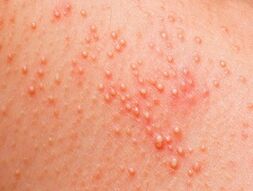Parasites are pathogenic organisms that can survive in animals and even in certain plants.There are many types of organisms in the world that penetrate into the host's body, feed on its beneficial substances, actively reproduce and leave waste in its body, leading to the development of various diseases.
Most of the time, worms are found in humans.These are worms of all lengths and sizes that live mainly in the spinal gut.But some worms can penetrate the entire body and penetrate into muscles, liver, heart, joints, lungs and even the brain.
Worms can harm the owner's body, so everyone should know how to determine the presence of parasites in the body.But many people don't want to go to the hospital, and wasting time and testing on worms is unfounded.
In this case, a person can find out whether there are parasites in the body, bringing attention to such an important criterion, such as having some form of characteristic symptoms of Helminthiasis.What if they aren't?This won't happen!
However, in the early stages of worm invasion, signs of important activities of foreign microorganisms were weakly expressed, or they were not present at all.Only when the helmsman is actively developing, dense and obvious clinical conditions occur because their larvae cannot parasitize in a person.
How to establish the presence of worms in vivo without medical research?

Different types of parasites cause characteristic symptoms in the owner.If they are determined promptly and decrypted correctly, infection will be determined even in the early stages.
Therefore, the possibility of incorrect diagnosis will be minimized, which will allow for the use of folk or medically anti-parasitic correct and effective deworming.
Therefore, in order to identify parasites in the human body, it is necessary to pay attention to the symptoms:
- Ginger teeth at night.
- Allergic skin rashes - acne, acne, urticaria, herpes on the lips, eczema, erythema, papilloma, neurodermatitis, psoriasis, etc.
- The development of diseases of the upper respiratory tract (bronchiolitis, pneumonia, runny nose), which is characterized by casworm disease and actyosis.
- Swelling of the abdomen and diarrhea occurs because long-term worms prevent the excretion of bile and pancreatic juice.
- Constipation occurs when the worm forms a ball that covers the intestinal channels.
- Joint and muscle discomfort due to parasite migration.
- Strong irritability caused by painful symptoms.
- Permanent dry cough, not treated with standard antispermia.
Body temperature also increased to subfiber index.The causes of this disease may be allergies, intoxication in the blood, neurological disorders, internal organs and brain, and failure of function in anemia syndrome.

In addition, Genol, who lives in a person, greatly reduces his immunity, and therefore, patients often suffer from colds.The patient also caused protracted depression due to physical poisoning.
The characteristics of worm disease are nausea and vomiting, which are also caused by the release of toxic substances.In addition, certain types of worms can survive in the human body, forming specific hormones that affect the gut microbiota, which is why diarrhea occurs.
However, in some cases, this symptoms are not attributed to Helminthias, as they resemble signs of food poisoning.Although this may become a serious problem, treatment will begin later, the more damage it will cause the organs and systems of its owner, the time will be available to cause parasites.
Therefore, special tests should be performed in order to identify worm diseases at home.To do this, it is necessary to answer the following questions:
- Does itch in the anus occur at night?
- Have the lymph nodes increased?
- Is there a rash?
- How often does insomnia occur?
- Will vomiting and nausea occur?
- Is there a charter and muscle pain?
- What frequency does gastrointestinal flatulence occur?
- How often does the bitterness in the mouth appear?
If a person gives seven positive answers to these questions, it is possible to say that his body is infected by a worm.
How to determine the type of worm disease by symptoms?

At home, you can determine which servos solve the human body.But this can only be done during the development stage of parasites.
Equatorial disease and second round botany are characterized by neurological features, which are the most intense features in young patients.Aggressive behavior and nerve tension increase due to the effects of toxic substances on the nervous system.For similar reasons, the infected person suffers from migraine and dizziness.
Usually, caterpillaria is accompanied by joint and muscle pain, as well as swelling of the face and eyelids.This is due to the characteristics of Trichinell's life living in skeletal muscles.If you eat wild animals or pork, you can be infected by this parasite, and the heat treatment for wild animals or pork is not good.
Lanbi's disease affects the function of the liver and kidneys and causes the appearance of various allergic reactions.In addition, some people suffer from arthritis due to drunkenness and suffer from arthritis.In addition, invasive patients weaken their immunity, with the following diseases opposing:
- Sinusitis;
- Stomatitis;
- Bacterial vaginosis, etc.

One characteristic of intestinal disease caused by Pinworms is itching in the anal passageway.In addition, most infected people have faults in their work in the digestive tract.
Schistosomiasis is characterized by anemia syndrome.Malnutrition also occurs (pathogenic microorganisms inhibit favorable microorganisms).
Accompanied with clonal disease, fascia and opal diseases, the gallbladder is affected, and jaundice syndrome will also develop.Furthermore, in the context of these helminthias, the liver and spleen are increased.
Strong actipathy is manifested by many symptoms.Therefore, as it progresses, gastrointestinal tract failure, indigestion diseases and allergic manifestations.
How to determine if there are any helmsmen with laboratory conditions?When worms are in the reproductive stage, it is very simple to understand their presence in the body.To do this, you need to analyze the parasite eggs.
As Opisthorchiasis grows, you can do your research at home by yourself.To do this, it is necessary to attach tape or tape to the skin in the anal area.
It is best to do this procedure immediately after waking up in the morning.If a person has opal, their eggs will be detected on the adhesive surface of the tape.
Laboratory methods for identifying parasites
If the patient suffers from more than three characteristics of helminthosis, he/she should contact the medical institution to determine the presence of parasites in his/her home.

First, if worm invasion is suspected, a fecal study was conducted.This allows you to identify eggs with tape, round rudder and dish.However, in order to accurately confirm the diagnosis, three analysis must be performed every few days.
To determine gastrointestinal disease, scratches are performed near the anus.Again, one of the most accurate and convenient analyses for patients is ELISA, which allows you to detect antibodies produced in the blood of the human body during the parasitic process of pathogenic microorganisms.
Sometimes, biological arrangement diagnosis is performed to study the frequency of parasites.This method is very useful because it determines the state of the entire body.In addition to parasites, such studies allow you to identify immunity, thereby weakening it, identifying other diseases, as well as pathogenic fungi, bacteria and viruses.










